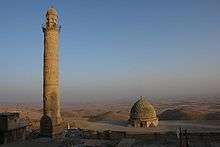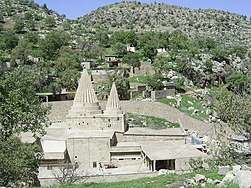Religion in Kurdistan
Religious diversity has been a feature of Kurdistan for many centuries.[1] Main religions that currently exist in Kurdistan are as follows: Islam, Christianity, Zoroastrianism, Yarsanism, Yazidism, Alevism, and Judaism.[2][3] Today, Sunni Islam is the most adhered religion in Kurdistan.[4]
 |
|
|
Modern history
|
Islam

The majority of Kurdish people are Muslim by religion. Islam has gained strong popular support and historically acted as a back-bone of the Kurdish Movement.[1]
Sunni Islam
The majority of Kurds are Sunni Muslims. The exact proportion is uncertain but McDowall gives the percentage as 'approximately 75%',[5] while Martin van Bruinessen estimates around two thirds or three quarters at least. Sunni Kurds follow the Shafi‘i madhhab, which distinguishes them from Arab and Turkish neighbors who in general are Hanafi. This difference is identified by some Kurds as being essential to their ethnic identity and deliberately emphasized.[1]
Historically, Kurds played an important role in Islamic intellectual development. Kurdistan was situated in a geographic location which enabled Kurds to equip Arabic, Persian and Turkish, all had been principal languages of Islamic civilization at different times. This condition had made Kurds playing mediators of different Islamic cultural centers. Kurdish ulama were especially significant at the high ranks of Ottoman Nizamiye Courts, Al-Azhar University in Cairo and the holy cities of Mecca and Medina in the Arabian Peninsula. After the securalization of Turkey, Turkish Kurdistan became the only remaining place where traditional Islamic institutions were preserved in the country, and many Turkish Muslim scholars went to Kurdistan in order to obtain the Islamic education.[1]
Sunni Islam among Kurds is characterized by a strong overtone of mysticism and its scholars’ affiliation with Sufi orders. In Kurdish society these constitute a hierarchical system, in which the leaders (sheikh) deploy their influence onto the localities through their deputies (khalifa), who mediate between sheikhs and common people. Today, Naqshbandiya and Qadiriyya are the most active tariqas. These tariqas had produced numbers of significant figures in the early history of Kurdish nationalist movement, including Mahmud Barzanji of Qadiriyyah, and Sheikh Said and Sheikh Ubeydullah of Naqshbandiyyah. Strong influences of sheikhs in the late 19th and the early 20th centuries were attributed to the Ottoman administrative reforms and the defense against the intrusion of Christian missionaries.[1]
Modern political development among Sunni Muslim Kurds varies throughout the state to which they belong. In Turkey, Said Nursî exerted major influence. In the early days, Nursi contributed significantly to the formation of Kurdish nationalism. Later, Nursi broke with the nationalists and devoted himself to intellectual development. This became the basis of the Nur Movement which espoused Islamic Modernism, mysticism, compatibility with modern science and tolerance. The Nur movement garnered several million followings in the mid 20th century.[6] The group fragmented substantially in the 1970s and 1980s, resulting in offshoots such as the Gülen movement.[7] In Iraqi Kurdistan and Iran, although Muslims are pious, Islam didn’t take a root as a strong political rallying force.[1] Today, significant movements include Kurdistan Islamic Union led by Salaheddine Bahaaeddin and Kurdistan Islamic Group led by Ali Bapir.
Shia Islam
There is a minority of Twelver Shi'i Muslims in southern parts of Kurdistan in Kermanshah, Khanaqin and the Ilam Province.[1] The proportion of Kurds who ascribe to Twelverism is potentially up to 15%.[5]
Alevism
Alevi community that sometimes are called Qizilbash, mostly live in north western parts of Kurdistan. They are mostly concentrated in Tunceli Province.
Yazidism

Yazidism is the oldest religion that are associated with Kurdistan. It is the oldest and first religion in Kurdistan. Most of the 700,000 members of the ethno-religious group known as the Yazidi people live in Iraq and Syria or the diaspora. For centuries they have been subjected to persecution and many of them have converted to Islam and Christianity.[1]
Yarsanism
Yarsanism (also known as Ahl-I-Haqq, Ahl-e-Hagh or Kakai) is one of the old religions that are associated with Kurdistan. The Yarsani consider themselves to be the original Kurds, scholars estimating the religion to be at least 3700 years old.
Although most of the sacred Yarsan texts are in the Gorani and all of the Yarsan holy places are located in Kurdistan, followers of this religion are also found in other regions.[8] For example, while there are more than 300,000 Yarsani in Iraqi Kurdistan, there are more than 4 million Yarsani in Iran. However, the Yarsani lack political rights in both countries.
Zoroastrianism
Zoroastrianism was one of the dominant religions in Kurdistan before the Islamic era. Currently, Zoroastrianism is an officially recognized religion in Iraqi Kurdistan and Iran. On 21 September 2016, the first official Zoroastrian fire temple of Iraqi Kurdistan opened in Sulaymaniyah. Attendees celebrated the occasion by lighting a ritual fire and beating the frame drum or 'daf'.[9] The Zoroastrian faith has around 500 followers according to official research from the religious affairs committee from the parliament.[10]
Christianity
Christianity is present in the Kurdistan Region of Iraq through the presence of two distinct communities, Kurdish Christians and non-Kurdish Assyrians. The Assyrian communities in the Kurdistan Region of Iraq live primarily in the Erbil and Dohuk Governorates.[11]
Secularism
In the 21st century, Kurdish polities began adopting secularism as a political principle in the Middle East. This is not least due to the Kurdistan Communities Union movement and their radically secular Rojava model project in the Democratic Federation of Northern Syria[12][13][14]. Kurdistan has been referred to as "the last safe haven for secularism" in a region rife with religious extremism. In 2012, the semi-autonomous Kurdistan Regional Government of Iraq (KRG) declared that public schools were to be religiously neutral and that all major religions of the world are taught on an equal basis. As of 2012, KRG and Rojava (Syrian Kurdistan), are the only administrations in the entire region that do not openly endorse a single religion in public schools.[15]
References
- Van Bruinessen, M. (1991) "Religion in Kurdistan." Kurdish Times. New York, vol.4, nos 1-2. pp.5-27.
- "Who was the first female „rabbi"?". Yekta Uzunoglu. Retrieved 2018-07-06.
- "Judaism in Kurdistan: the country on which Arch rested". Yekta Uzunoglu. Retrieved 2018-07-04.
- Cigerxwin, Tarixa Kurdistan, I (Stockholm: Weşanên Roja Nû, 1985), p. 17.
- McDowall, David (1997). A Modern History of the Kurds. Bloomsbury, London: I.B. Tauris. p. 10.
- Paul Dumont "Disciples of the Light: The Nurju Movement in Turkey," Central Asian Survey 5:2 (1986): 330.
- Annika Rabo; Bo Utas (2005). The Role of the State in West Asia. Swedish Research Institute in Istanbul. pp. 53–. ISBN 978-91-86884-13-0.
- Martin van Bruinessen, When Haji Bektash Still Bore the Name of Sultan Sahak:Notes on the Ahl-i Haqq of the Guran district
- "Hopes for Zoroastrianism revival in Kurdistan as first temple opens its doors". Rudaw. 2016-09-21. Retrieved 2016-10-08.
- "پەرلەمانی كوردستان ئەمڕۆ كۆدەبێتەوە". February 12, 2018.
- "Iraqi Kurdistan: Political Development and Emergent Democracy". Google Play.
- "Syria Kurds challenging traditions, promote civil marriage". ARA News. 20 February 2016. Retrieved 8 October 2016.
- "PYD leader: SDF operation for Raqqa countryside in progress, Syria can only be secular". ARA News. 28 May 2016. Retrieved 8 October 2016.
- Carl Drott (25 May 2015). "The Revolutionaries of Bethnahrin". Warscapes. Retrieved 8 October 2016.
- "Secularism: essential to Kurdish identity". Kurdistan 24 News.